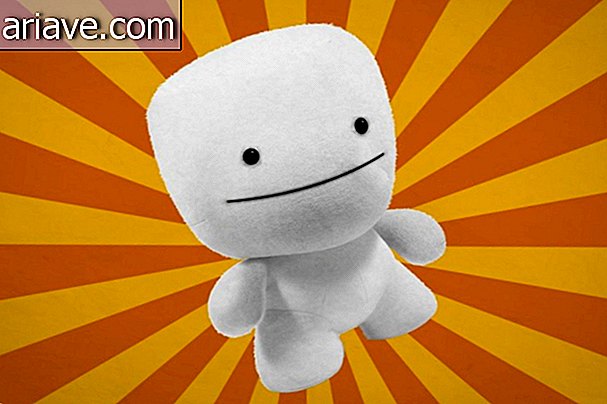Have you heard of the tie personality? Learn more about her here
A few days ago we talked here at Mega about how the human brain is affected when it comes to empathy. You may not know it, but there is one type of personality that is being studied more and more: empathy.
Stalemates are basically extremely sensitive people who can sense the energies of the environment and the people around them. They usually have large variations in mood, as the way they feel is influenced by sounds, smells, places, animals and even climatic aspects. Because of this hypersensitivity, they often feel overwhelmed.
Simply put, the description above defines what it is like to have a tied personality. The term, however, has different forms of definition, as it is studied by aspects of psychology, neuroscience and even science fiction.
Definitions

“Stalls are highly sensitive, tuned instruments when it comes to emotions. They feel everything, sometimes to the extreme, and are less apt to intellectualize feelings. Intuition is the filter by which they experience the world. Stops are naturally givers, spiritually attuned, and good listeners, ”summarized psychiatrist Dr. Judith Orloff.
For science fiction, empaths are people with an ability to read the emotions of others "through a form of extrasensory perception." They are not telepaths, however, since this sensitivity does not mean that they can read minds - in that sense, we can use adviser Deanna Troi of "Star Trek: The New Generation" as an example of a stalemate.
“Being a drawman is much more than being highly sensitive, and not limited to emotions alone. Empaths can perceive physical sensibilities and spiritual urges, just as they only know what other people's motivations and intentions are. Either you are a draw or you are not, ”Christel Broeuderlow wrote on The Mind Unleashed, which publishes only content related to new discoveries and insights into the human mind and behavior.

Since we talk a lot about sensitivity and energy in defining ties, it is common for more skeptical people to question these definitions, but the truth is that science also studies this kind of temperament. In this research, for example, scientists have shown that there is a relationship between anxiety attacks and a tied temper.
"The results support the hypothesis that individuals with high social anxiety may demonstrate a unique social-cognitive profile with high empathic cognitive tendencies and high accuracy in mental and affective state assignments, " says the study's conclusion.
This link between a tied personality and anxiety and social problems has to do with the fact that these people often feel a real need to be alone. As they are “emotional sponges”, they become overwhelmed and absorb the feelings of strangers, including.

This issue of emotional absorption, when studied within neuroscience, assesses the differences in brain activity between tied and non-tied individuals. In 2013 it was discovered that the empathy-linked brain area is located in the supramarginal gyrus, which is part of the cerebral cortex and is located near the temporal and frontal lobes.
It is basically a region of the brain whose function is to distinguish between our own emotions and those of others. When we need to make a decision very quickly, for example, this region has its activity reduced.
There are many studies that seek to understand the mechanisms of empathy, including when seeking to better understand psychopathy - psychopaths are unable to empathize. It seems that the psychopaths' brain activities are the opposite of that of the empaths - while the empaths suffer from the suffering of others, the psychopaths even have fun with it.

When it comes to the brains of empathy, we can also consider mirror neuronal activities, which explains how empaths can feel so quickly what the other person is feeling. An experiment published in Scientific American proved that ties are really capable of feeling the feelings of others.
To be sure, a group of volunteers had their brain activities monitored by MRI, so scientists could recognize this mirrored neuronal behavior. While being monitored, participants watched short films that showed people being touched.
"Brain scans revealed that the somatosensory cortex, which is a complex of brain regions that process touch information, was highly active during film presentation - even though participants were not being touched at any time, " explained Jakob Limanowski., PhD student at the Berlin School of Mind and Brain.

It is important to note that these scientific evidences are related to empathy, but not to the definition of the individual as empathy. This definition, although it exists and is applied by those who study the subject, is based on studies involving only empathy itself.
The psychiatrist Orloff, whom we quoted at the beginning of the text, has asked a list of questions you can ask yourself if you think you might be a drawer and want to take the nine test. Check out:
- Have I ever been labeled "too emotional" or extremely sensitive?
- If a friend is nervous, do I get nervous too?
- Is it easy for someone to hurt my feelings?
- Do I get emotionally drained in crowds and need some time alone to recharge?
- Am I affected by loud noises, smells and conversations?
- Would I rather drive to places instead of hitchhiking so I have the freedom to leave whenever I want?
- Do I overeat to deal with my emotional stress?
- Am I afraid of being engulfed in close relationships?
Orloff explains that if you answered “yes” to more than three of these questions, it is quite possible that you have a temperament or at least have strong traces of that temperament. The expert says that recognizing how to tie is the first step for those looking to better deal with the problems that this can bring, especially with regard to interpersonal relationships.

The feeling of lack of energy, the difficulty of getting too involved in social situations or with many people, the extreme need for loneliness and the difficulty of watching movies or series with violent and / or dramatic themes are some of the factors that compromise social life, affective and professional empathy.
In that sense, you have to accept that this is your personality type. While most people are terrified of loneliness, a drawer doesn't have to feel bad about really enjoying being alone. Stalemates are people who need to be away from others from time to time, precisely because they absorb their energy too much.
These individuals can benefit from time spent in contact with nature, meditation and yoga exercises, and even learn to say no, as it is quite common for people to draw when they need help or when they need it. venting about some very intimate problem - because they are good listeners and can put themselves in the shoes of others very easily, empathy often gives good advice, and people love those who give attention and good advice.
Empaths need to respect their own needs, yet they constantly feel like helping others. If you go to a party full of friends who love and feel the need to leave two hours later, that's what they should do. It doesn't mean they don't like their friends or the party, but they have a different way of socializing. Regardless of your temperament, respecting your own needs is critical.
What is the strongest trait of your personality? Comment on the Mega Curious Forum











